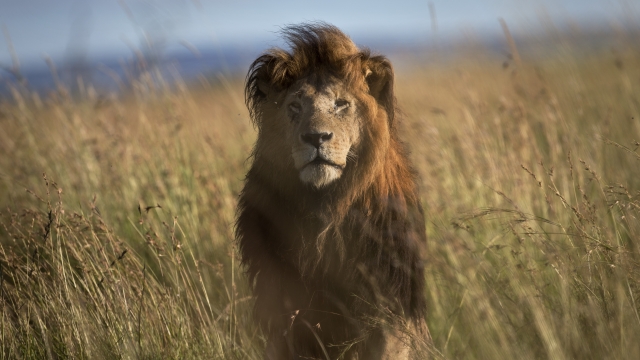In late December, Congress passed the Big Cat Public Safety Act. The law bans the controversial practice of "cub-petting," or letting members of the public touch and hold cubs of tigers, lions, leopards and more. It also bans new private ownership of big cats as pets — meaning current owners can keep their animals but must register them with U.S. Fish and Wildlife Service.
Many considered it a huge feat, especially considering how big the private ownership industry is for exotic animals.
Global trade for exotic pets is a multi-billion dollar industry, and demand has been increasing — likely a result of new e-commerce sites and social media platforms that help people find and trade animals.
The U.S. is one of the biggest markets for wildlife trade. A recent paper found the U.S. imported about 3.24 billion live animals between 2000 and 2014, and nearly all were for commercial purposes, like the pet industry.
Tim Harrison, a retired police officer who has worked for decades as an exotic animal specialist, has investigated a number of cases of exotic animals used for cub-petting or TV appearances that would later go missing.
"It happens so often," Harrison said. "Some of my incidents is... where a full-scale mountain lion's running loose in downtown Dayton, Ohio. Nobody knows where it came from. It's one of those situations where it started off being rare. We get a call maybe every once in a while, maybe five a year... and that's in the tri-state area of Ohio, Indiana, Kentucky. And after reality TV started, it exploded."
Private owners — like ranchers, breeders and pet owners — have been growing exponentially over the last few decades. Even rare, big cats have been a growing part of the market. Authorities estimate more tigers are living in captivity in the U.S. than in the wild today across the globe.
Though it is hard to say exactly how many animals are in captivity, which includes everything from roadside zoos to everyday backyards, there is no central database.
When it comes to owning big cats, states varied on permit requirements, and at least three states required no permit at all.
"You have to have tags for your dog, but you have to have nothing for a lion?" Harrison said. "So we really can't keep track. There is nothing when somebody says there's 3,000-plus tigers, and that's not even counting lions, leopards and everything else in the state of Texas. That's only the tip of the iceberg."
But the Texas-based Exotic Wildlife Association, which represents thousands of ranchers, estimates the exotic animal industry brings in about $2 billion in revenue annually.
Popular animals like tigers can sell for less than $1,000, while cubs can sell for more than twice as much. Other large exotic animals can go for much more, depending on their rarity. According to auction prices from 2021, a gemsbok can sell for about $10,000, and a gazelle or zebra could go for as much as $20,000.
Some of these animals aren't just bred and traded between zoos and pet owners; they might also be bred to be hunted, which is fully legal even if they're an endangered species. It isn't subject to state regulations, and the exotic animals can be hunted year-round, all for a price.
Chris Leland, who runs one such hunting service called Hunt Aoudad, explained in an interview with Insider in 2021 how much a typical exotic animal hunting trip could cost.
"They're gonna spend probably five grand on their travel, their lodging, their food, their hunt, and then depending on the degree of taxidermy, another 12, 14 hundred dollars," Leland said.
For more rare animals, the price to shoot can get up to the tens of thousands as well.
Proponents of the practice argue it's actually beneficial for conservation. By law, 10% of the proceeds must go to conservation programs. They've also argued some endangered species can benefit from being bred freely in the U.S. and then sent back to native countries, though there isn't hard evidence that exotic animal owners in the U.S. have helped stabilize animal populations abroad.
Aside from the ethical debate over exotic animal hunting, critics have argued that unregulated, private ownership can open the door for different kinds of abuse. That's why the Big Cat Safety Act didn't just crackdown on just buying new animals; it also went after the controversial cub-petting industry.
Cub-petting has been a popular attraction for zoos across the country and a reliable revenue-generator. It was featured heavily in the hit Netflix documentary series, "Tiger King."
But critics of cub petting point out this encourages so-called "speed-breeding," forcing mothers to produce as many cubs as possible despite any health risks. It's also not always clear what happens to cubs after they get too old. Many have been killed once they're no longer profitable.
"When they reach a certain size, they can't use them anymore to take them around because they'll claw somebody, so what they'll do is they'll dump them in these auctions," Harrison said.
It's worth noting that "Tiger King" was even cited as a big reason the Big Cat Safety Act was finally pushed through Congress after being worked on for over a decade. The law was a huge win overall for animal rights activists in ending the cub-petting industry and making significant steps toward regulating private ownership in the exotic animal industry.
"We want to stop all that madness and make sure people understand this is not just a big cat problem; it's a public safety problem," Harrison said. "That's American tigers, these American snow leopards, and we need to care for them in that fashion and stop the breeding."
TRENDING
- Recent Obituaries
- 'Pallet shelter village' in Great Falls?
- A Waiting Child: Marissa
- Alternatives to Indian reservations?
- Follow KRTV on TikTok
@krtvgreatfalls 'High School House'; Fitness Challenge



